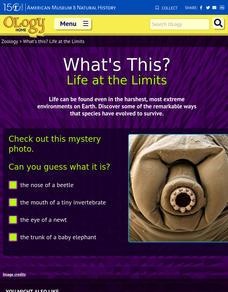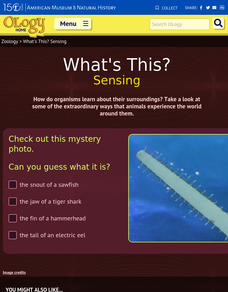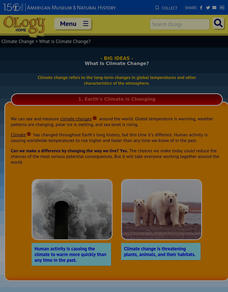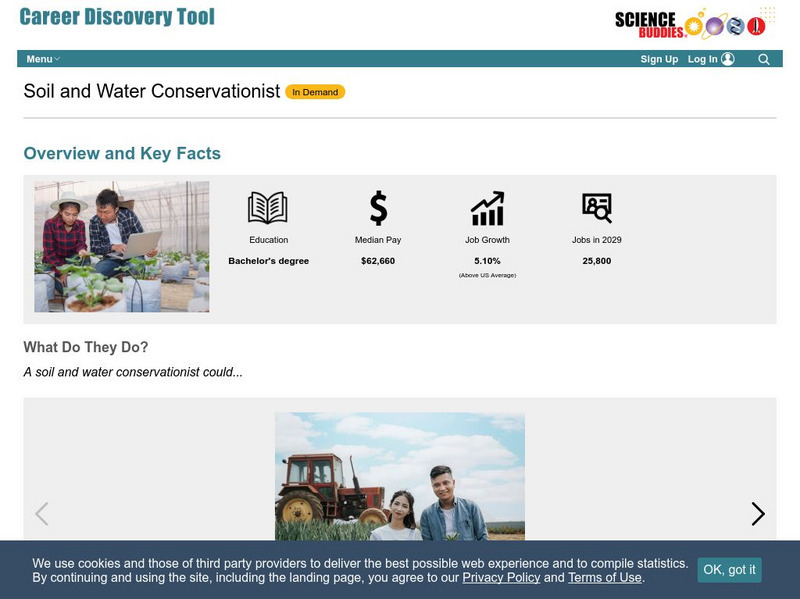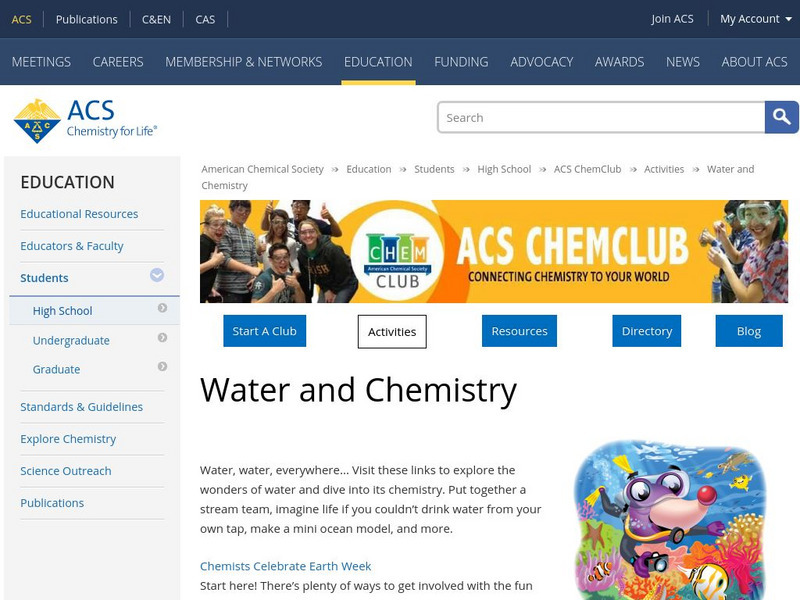American Museum of Natural History
What's the Big Deal About Water?
It may seem simple, but water is one of the most unique substances on Earth. An interactive online lesson describes its properties and importance in so many different situations. Learners interact with the lesson to learn the role water...
American Museum of Natural History
Fascinating Fish
A fish is not just a fish. So many fish in remote places have unique characteristics. Take a trip with an ichthyologist to the Congo River to discover the species of one of the most diverse fish populations in the world. The online...
Biology in Motion
Urine Concentration in 3 Easy Steps
The color, density, and smell of urine all relate to kidney function. Pupils observe the kidney controlling the concentration of water through three different steps. It mentions how each function might change the appearance and scent of...
American Museum of Natural History
What's the Big Deal About Paleontology?
Paleontologists could be considered detectives of the past. A quick online lesson describes the science of paleontology and the importance of fossils. Young scientists read about how paleontologists analyze the features of fossils to...
American Museum of Natural History
Bio-Benefits
Kick-start a discussion of the importance of biodiversity with a colorful resource that touts the benefits of maintaining healthy ecosystems. The images stress the interdependence of all the elements of an ecosystem.
American Museum of Natural History
Ask a Scientist About Our Environment
Scientists respond to 26 question posed by learners. These experts answer in easy to understand language, include photos to illustrate the issue, offer suggestions for how young people can make a difference, and supply links to resources...
American Museum of Natural History
What is Marine Biology?
A marine environment covers the majority of the earth but is arguably the least understood. Teach young scientists about the characteristics of oceans and ocean species using an interactive online lesson. The in-person or remote learning...
American Museum of Natural History
What's This? Life at the Limits
There are some amazing ways species evolve to survive. From large ears to sneezing salt, learners read about these interesting adaptations in an interactive lesson. Great to supplement an in-class lesson, it also works well as a remote...
American Museum of Natural History
What's This? Sensing
There is a scallop that relies on sight so much that it actually has more than 100 eyes! There are many species that rely heavily on one sense or another. An online interactive resource has youth read about several of these animals. The...
American Museum of Natural History
Ask a Scientist About Our Environment
Let's ask an expert! Scientists at the American Museum of Natural History field questions about the environment in an interactive resource. Question topics range from global warming and conservation to endangered species and habitats.
American Museum of Natural History
What's This? Feeding
Some species have pretty creative methods for catching food. Young scientists learn about some interesting ways organisms get the nutrients they need by navigating an online interactive lesson that would be suitable for a remote learning...
American Museum of Natural History
A Whale of a Tale
What's the most interesting fact about a blue whale? Learners read an interview about the similarities between the Titanosaur and the blue whale displays at the American Museum of Natural History. Pupils learn not only about blue whales...
American Museum of Natural History
What is the Greenhouse Effect?
Without the greenhouse effect, Earth would not be inhabitable. A thorough online resource describes the greenhouse effect and how it occurs. The source highlights the different types of gases that work together to absorb the sun's...
American Museum of Natural History
What Is Climate Change?
So many factors show that climate change has arrived. Learners read through an online resource that explains the data and the consequences of climate change. They also review strategies for slowing or even reversing the global influence.
American Museum of Natural History
Earthquakes Tremors From Below
Earthquakes are really no one's fault. A thorough lesson explains the different types of earthquakes how they happen. Learners interact with the online lesson to simulate earthquakes and examine their results. The lesson is appropriate...
American Museum of Natural History
What's This?: Mythic Creatures
Fantastic beasts, and where to find them, are featured in a resource that offers images of real animals that just might have given rise to some of mythic creatures of legend.
US Geological Survey
Usgs: Water Science for Schools Effects of Urbanization
This U.S. Geological Survey website offers a short article then lists topics that are linked to brief articles that describe that particular topic's effect on water quality in urban areas. Click Home to access the site in Spanish.
US Geological Survey
Usgs: Water Science School:water Quality
Learn about the importance of water quality and environmental influences that reduce it.
Science Buddies
Science Buddies: Career Profile: Soil and Water Conservationist
Soil and water conservation are important in the protection of the earth's natural resources. Read about the careers that study and encourage conservation. Find out about the educational requirements necessary to become a soil or water...
Science Buddies
Science Buddies: Career Profile: Hydrologist
The career of hydrologist could become more and more important as the use of water increases. Find out about the education needed to become a hydrologist and read the Science Buddies profile about the many areas hydrologists use their...
US Geological Survey
Usgs: National Water Quality Assessment Program
Use this website to find out about water quality issues anywhere in the U.S.A. where water studies have been conducted by the U.S. Geological Survey.
American Chemical Society
American Chemical Society: Explore Chemistry: Water and Chemistry
Explore water's unique properties in the activities here. Includes ideas for starting a chemistry club, ideas for Earth Day, articles, and videos.
PBS
Pbs News Hour: Water Recycling
PBS and the Online NewsHour have created this multimedia website about water recycling. You can see how this process is different than other waste water treatments by reading interviews, watching a slideshow or investigating a map of...
Other
Nutrition Action: Water, Water, Everywhere
The Center for Science in the Public Interest offers a discussion of contaminants that can be found in tap water and chemicals added to water in the public water systems. The topics discussed are arsenic, parasites, lead, turbidity, and...
Other popular searches
- Science Properties of Water
- Water Science Project Ideas
- Science Water Use
- Science Everyday Water Use
- Water Science Glaciers
- Science Water Cycle
- Earth Science Inquiry Water
- Science Water
- Water Science Properties
- Water +Science Glaciers
- Water Science Phosphorous
- Science Water Clarity







